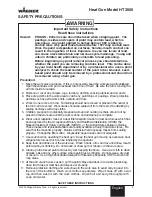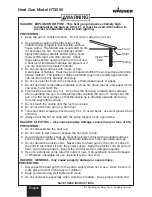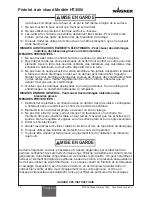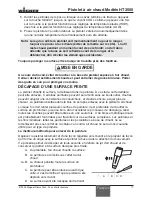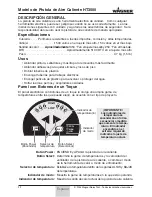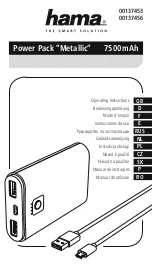
Heat Gun Model HT3500
English
© 2004 Wagner Spray Tech. All rights reserved.
7
Always protect glass when working near windows.
Do not touch nozzle when working. It becomes extremely hot and will cause severe
burns. Wear gloves to protect hands from hot scrapings.
STRIPPING PAINT
The heat gun heats up the surface and causes the paint to soften, at which time it can be
scraped off easily without damaging the surface. Some paints may soften even though they
do not blister; some may become rubbery, and some may require higher heat. Paint
absorbed into wood will not be removed with the heat gun.
When working with several layers of paint, it speeds up the scraping process to heat the
surface thoroughly, all the way to the wood. Then all the layers can be scraped at one time.
A soft wire brush may be the best tool to use for very intricate surfaces. Mineral paints
and finishes, such as cement paint and porcelain, do not soften with heat, so using a
heating tool will not work for paint removal.
The best method of paint removal
Move the gun slowly and steadily forward at an angle to the surface, pointing the nozzle
in the direction of motion. This allows you to scrape safely outside the hot air stream
and keeps the scraper and the scraped surface cooler.
A.
Warm air preheats the surface.
B.
Paint is softened by hot air.
A + B.
Deep penetration of heat over total area.
C.
Paint can be easily scraped off as soon as it
is softened and the gun is moved forward.
D.
Stripped surface allowed to cool.
The removal of paint by heat gun is safe if the above guidelines are used, but
always keep either a container of water or an ABC fire extinguisher within reach.
Read the general operating and safety information sections of this owner's manual
before using the heat gun.
CAUTION
Note: Do not use the heat gun on surfaces that can be damaged by heat, such
as vinyl-coated paneling, siding or window frames.
When removing paint from window frames, the heat gun will soften the putty. Be
careful not to gouge the putty with the scraper. The putty will firm up after it cools.
Do not use the heat gun on insulating laminated window glass such as
Thermopane. The glass edge expansion may break the edge seal.
When scraping fascia, do not overheat the edges of the asphalt
shingles protruding over the edge of the sheathing. Too much heat will
melt the asphalt.
AB
C D
WARNING
Note: Always set the heat gun upright after it is turned off, either for a short
break or for storage. Avoid laying the unit on the side after shutdown.
The heat will remain in the unit and cooling will take longer. Store the
unit only after the nozzle is cool. Unplug the unit before storing to
prevent accidental startup.



